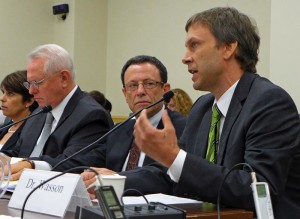
Appalachian Voice’s Director of Programs Matt Wasson testifies before Congress about the burden of mountaintop removal coal mining on Appalachian communities
Last month, our Director of Programs Matt Wasson got the chance to tell a rapt audience in Washington, D.C., that the emperor has no clothes. The audience was the U.S. House Energy and Commerce subcommittee on Environment and the Economy, the reporters in the room, and anyone who happened to be watching on CSPAN.
The majority members of the committee had called the hearing in an attempt to portray federal environmental protections as overly burdensome and to trumpet state efforts to “streamline” them. As Matt described in his testimony, however, the facts for the people living in the Appalachian counties most heavily impacted by mountaintop removal coal mining under the ostensibly watchful eye of state agencies are these:
- They are 50% more likely to die from cancer than others in Appalachia
- Their children are 42% more likely to be born with birth defects
- They have a life expectancy far below the national average and comparable to those in El Salvador and Vietnam.
Rep. Henry Waxman of California, picking up on Matt’s revelations, noted the similarly atrocious handling by North Carolina officials — in the absence of any federal rules on coal ash — of the catastrophic Duke Energy coal ash spill in February. In the end, the hearing turned into an indictment of the fallacy that states can be counted on to defend their citizens against the profit-driven vagaries of the coal industry and energy giants like Duke.
And while Matt had a rare opportunity to provide a reality check in the ceremonial milieu of a congressional hearing room, it’s the people living in places like Wise County, Va., Pike County, Ky., and Stokes County, N.C. (the site of Duke’s largest coal ash pond), who know this reality better than anyone. It’s their voices, their courage and their persistence — in combination with technical experts like Matt speaking truth to power — that will ultimately bring about real change in their communities.



Thanks for protecting the Public. I have feared Duke Engery for a long time in N.C..
These arcahic and poisonous methods need to stop!! I have a home in the Smokes!!
When can NC step up to the future and stop ruining our State land and Health!
Allowing this to continue is a sin against the public. It is “dumping” the burden of
Health Cost on to the State and Families ( Wheres the morality in this?)
Sincerely,
Wendi Abbott
Coal, touted as a job provider and an economic necessity for West Virginia (and
Appalachia in general), has, historically, left destruction in its wake. It has enriched a few and impoverished many. Whole communities have been destroyed as well as many
sources of potable water. Beautiful mountains have been blown to smithereens, leaving a wasteland in their place. Huge pits of mining waste remain, a threat to the health of
anyone living nearby. The sooner we can rid ourselves of this destructive force (and,
regretfully I do not see this happening with the present political climate), the better we
will be. Clean energy (there is no such thing as ‘clean coal’) is our best hope. This can provide jobs and economic growth that everyone wants. k.a.s.
I think it is absolutely criminal what our Government Agencies are allowing to continue happening to the residents of these communities. What is their incentive for not working for the health and wellbeing of the people?
Great testimony ! I am sure it is a rare occasion when this committee hears such compelling, factual information.
Thanks , again for all you do for AV and on behalf of the folks of Central Appalachia !
Here is some great video of Rep. John Yarmuth at this hearing, talking about mountaintop removal human health impacts with Matt Wasson.
We most definitely need to transition from an energy paradigm based on fossil fuels to one that is more sustainable. It is commonly understood that those sustainable forms have either something to do with the sun or natural shifts of energy through falling water or wind.
But the transition will not happen over night, nor should it. So in the mean time, please consider the idea of replacement instead of displacement of fossil fuel sources for energy. Where it is possible, generate heat or electricity with the sun. Where it is not, such as at night time, then use fossil sources. For now…..and get ready for the day when we can make a complete and successful switch to sustainable forms of energy…JW